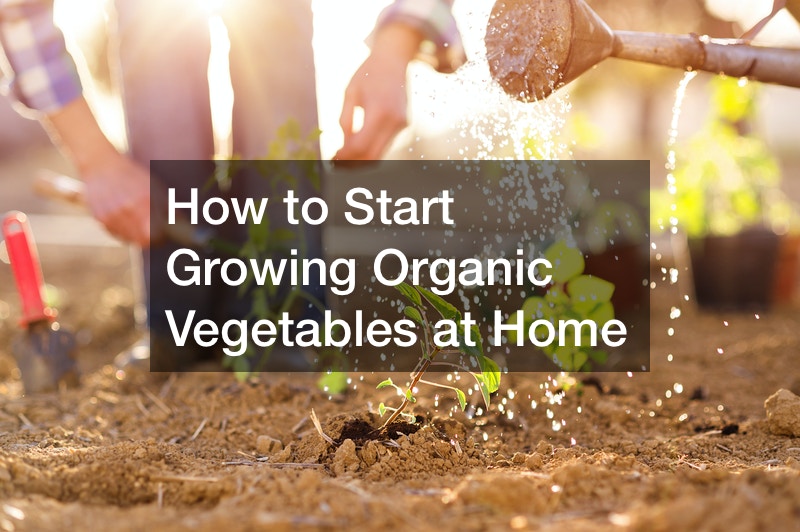
Many people are currently increasingly concerned about the nutritional value and safety of the foods they buy from their local grocery stores. In particular, health concerns over genetically modified produce and excessive use of pesticides have made many people consider the idea of growing organic vegetables at home. Below are some ways on how to start growing organic vegetables at home.
Use vertical gardening techniques
In case you have a small gardening area, you can consider using a vertical gardening technique to maximize your space. In particular, you can have more space to plant your vegetables using strings, cages, trellises, and other support equipment to train some vegetables to grow upwards instead of spreading out. Also, vertical gardening enhances improved circulation that helps prevent mildew and other diseases by ensuring that your vegetables are kept above ground level.
Crop rotation is one technique that most farmers use because it helps minimize pests and diseases and prevents depleting certain soil nutrients. Therefore, as you learn how to start growing organic vegetables at home, you should avoid planting the same plants in one pot every year.
Use raised beds
You can use raised bed to offer your vegetables rich organic soil and extend your growing season. The soil in your raised beds would warm up faster during spring and make it easier to weed and harvest. However, it would be best if you were careful to avoid using chemically treated components such as pressure-treated wood when building your raised bed; it can affect your plants’ growth. If you are not sure how to build your raised beds, you can seek assistance from a professional landscaping expert.
Use companion planting principles in your garden
Certain plant combinations grow well when planted together. Therefore, you should look for compatible herbs or flowers that you can plant with your vegetables to help increase yields, reducing diseases, and deterring insects.
Plant flowers near your garden to attract pollinators

Vegetables rely on nature to grow, and pollination plays a critical role in their growth. You can encourage pollinators such as bees to visit your vegetables by planting flowers nearby or in the garden. Although such pollinators are reasonable, you should undertake honey bee control for undesired swarms. Some flowers you can plant include daisy, sunflower, cleome, salvia, purple coneflower, marigold, and black-eyed Susan. However, seeking professional gardeners’ advice is very critical because they will educate you on the best flowers to plant and how to start growing organic vegetables at home.
If possible, plant heirloom varieties
Heirloom vegetables are one of the traditional crops that are longer-lasting and disease-resistant. They do have several benefits over the current hybrid vegetables. Some of their benefits include more nutrition, exceptional taste, cheaper, and you can save their seeds for the next planting season.
Purchase seedlings or seeds from reputable sources
You should ensure that you buy certified organic seeds or seedlings which were raised without chemicals or pesticides. You can get your certified organic seedlings from most of the local nurses or farmers’ markets.
Make your organic mulch and compost
You need to supply your vegetable garden with a lot of organic matter. In this case, you can use compost manure because it will help to retain soil moisture and offer a source of nutrients for your vegetables. Compost has microbes and worms that can assist in improving the quality of your soil structure.
Tips to start your veggie garden

Decide on the crops that you want to grow
There are several types of veggies that you can grow. If you wish to avoid confusion on how to start growing organic vegetables at home, you can follow these tips:
- Avoid growing a crop that you will not eat. In this case, you can focus on the vegetables that your family enjoys most.
- Choose crops that make sense for your location- To get the best veggies, you can talk to successful gardeners within your local areas to find out the types of crops that grow well. These gardeners can also educate you on how to start growing organic vegetables at home.
- If you wish to start a small garden, you should avoid growing crops such as giant pumpkin spread over a large area.
Choose a location to start Your garden
Most vegetables need a few hours of sunlight, especially when fruiting. However, root, herbs, and greens veggies can grow in a partial shade. As you choose your garden location, you should consider how you will wish to access it for watering, caring, and harvesting. In this case, you should avoid areas that receive high winds or frost that can hinder veggies’ growth. Also, when choosing the location, you should get in touch with a fencing professional so that they can install a proper fence around your vegetable garden. Through that way, you can prevent damage by children, pet damage, and other animals.
Plan your garden beds
As you learn how to start growing organic vegetables at home, you need to decide on your garden bed’s size and type. In this case, you can consider having a raised bed which tends to be attractive and easier to work with. However, such a garden can dry out quickly. If you live in a dry area, you can consider having sunken beds to gather the available moisture. You can also consider having a bed or blocks of crops instead of single rows. Your gardening beds should be approximately 10ft long. Planting tour veggies in rows are one of the practices of maximizing the growing space and minimizing walkways. Further, you can add soil amendments and fertilizer to the planting area.
You need to start a small and well-tended garden so that you offer every plan enough space to grow. In particular, you should avoid overcrowding your plants because they will not thrive well.
Enhance the beauty of your garden
Your tiles for outdoor living space can make a difference to your garden. If you wish to make your garden more beautiful, you can invest in patio flooring tiles with a sleek design. Such tiles will bring a minimalist feel and make your outdoor space feel cozy.
Invest in the right gardening tools
Investing in appropriate tools can make it easier and fun to work in your garden. In this case, you should avoid flimsy or dull tools when working in your garden. Some of the best gardening equipment you can buy include a leaf rake, a dirt rake, scuffle hoe, garden hoe, hand tools, and garden shovel. All you can do is choose the tool that you think will suit your gardening needs. As you choose the tools, you should avoid plastic tools. Notably, ensure that you buy the appropriate size tools to avoid damaging your crops when caring for your vegetables. You should also ensure that you keep your tools sharp and clean to serve you for an extended period.
Test your soil

Before you begin establishing your gardening beds or planting your veggies, you should know the type of soil you have in your area. In this case, you can try to find out the following issues:
- If the soil has a neutral, alkaline, or acidic pH.
- If you have loam, clay, sand silt, or a mixture of soil.
- If your soil has a good amount of essential nutrients
- If nearby roadways or structures can contaminate your soil.
- You can determine some features by looking at the soil, and others need professional lab tests.
Prepare your soil
Most plants need fertile, well-drained, and deep soil. After knowing how to start growing organic vegetables at home and having managed to build your garden, you can continue to add a combination of varied organic matter such as mulch, worm castings, and compost to improve its nutritional composition.
Choose the right seeds or seedlings
In case you wish to grow specific vegetables, such as heirloom varieties, you will be required to grow your seedlings. If you choose to buy your transplants, you should ask if they were sprayed or treated with harmful chemicals.
Planting your crops
Most transplant containers and seed packets come with basic planting instructions; after you have learned how to start growing organic vegetables at home, managed to prepare your garden, you can plant your veggies. While planting your crops, you should follow the following rules:
- You will need to protect your young plants because they can easily be damaged.
- If you opt to plant heat-loving plants, including okra, cucumbers, peppers, and tomatoes, you should wait until no danger of frost can damage them.
- Ensure you plant your transplants at the same depth they used to grow in the pot.
- Plant your seeds approximately three times deep their diameter or as directed.
Nurture your garden
If you think you might not get time to attend to your plants, you can opt for low-maintenance ones such as herbs and sprouts. When caring for your plants, the most important thing you should consider is watering. When watering your plants, you should approximately ensure one inch of water during the growing season. However, you should check the soil before watering your plants to avoid over watering. Also, you should monitor your crops for pests and weed control to encourage proper plant growth. Notably, you should invest in a good garden sprinkler system so that it can reach every corner of your garden. Getting the right fencing professionals can also be a step forward to help make your garden free from destruction by animals.
Enjoy your harvest
As your veggies mature, ensure that you harvest them promptly to enjoy the best quality.
Importance of vegetables for your family’s health

After learning how to start growing organic vegetables at home, you might wish to their benefits. Generally, including vegetables in your diet is one of the best ways to stay nourished and healthy. You will experience the health benefits of vegetables of veggies in the long-run by keeping your organs and overall health in perfect condition. In the food industry, you can find various vegetables that you should add to your diet, including broccoli, bell pepper, peas, spinach, asparagus, collard greens, swiss chards, microgreens, beets.
Dietary fiber
Vegetables are very rich in soluble and insoluble dietary fiber that absorbs extra water in your colon. In that way, they help to retain the moisture content of the fecal matter. Also, eating fiber-rich vegetables can help ensure that your digestive system is kept healthy and clean so that you avoid health complications such as colon cancer, bowel irregularity, diarrhea, and constipation. Since vegetables are rich in fiber, they will make you feel fuller for an extended period so that you minimize unnecessary eating and consequently help you in weight management or loss.
Vitamins
Vegetables have high vitamin K levels that are the most natural and ideal way to prevent bone issues. In particular, vitamin K will help in the production of osteocalcin protein which plays a critical role in proper bone health.
Also, vitamin K nutrients found in green leafy veggies such as swiss chard, turnip greens, and kale can lower your risk of having type 2 diabetes. Not only that, vitamin K can help to improve insulin sensitivity by ensuring that your body monitors your blood sugar levels and kept them at optimum levels.
In most cases, pediatricians recommend children to many vegetables because they are full of antioxidants, minerals, and essential vitamins, which protect against diseases and promote good health. Also, carrots can play a critical role in your eye health because they are rich in vitamin A.
Vegetables contain phytonutrients that can help to restore your damaged skin so that it looks healthier and younger. In particular, vitamin C in vegetables facilitates collagen formation that minimizes the appearance of wrinkles and speeds up the healing of burns, wounds, and other skin issues.
Allyl sulfides
Vegetables such as scallions, leeks, chives, onions, and garlic are rich in allyl sulfides, which help protect the digestive tract and stomach from fatal illnesses such as cancer. The components also help to lower high blood pressure.
Beta carotene and lycopene
Green vegetables are rich in beta carotene that improves immune function when converted into vitamin A by the digestive system. On the contrary, tomatoes have lycopene elements that can protect your eyes and experience minimal vision issues. If you do not eat a rich diet in green vegetables, you might have early blindness.
High water content
Naturally, vegetables have high-water contents. As a result, they are usually low in calories and fats. Therefore, eating a diet rich in vegetables can increase your water content and help you flush out waste products, including toxins from the body.
Cancer protective components
Eating vegetables such as broccoli, cauliflower, brussels sprouts, and cabbage have high amounts of isothiocyanates and indoles. Such components have protective features against skin cancer, breast cancer, and colon cancer.
Dental health
Having healthy and strong gums is one of the ways you can maintain healthy teeth. Fortunately, by eating celery, raw carrots, hard and fibrous vegetables, you can stimulate and assist in saliva production that cleanses your mouth. Such a case explains why many dentists recommend patients to consume lots of vegetables to achieve their dental care needs.
The popularity of organic foods has influenced most gardeners to switch to organic farming methods. The guide above can help you learn more on how to start growing organic vegetables at home to enjoy the benefits. Notably, veggies will take care of blood pressure levels, skeletal system, excretory and digestive system. In summary, growing organic vegetables is one of the best ways to ensure that your family enjoys fresh, tasty, and healthy food free from synthetic pesticides and chemicals.



